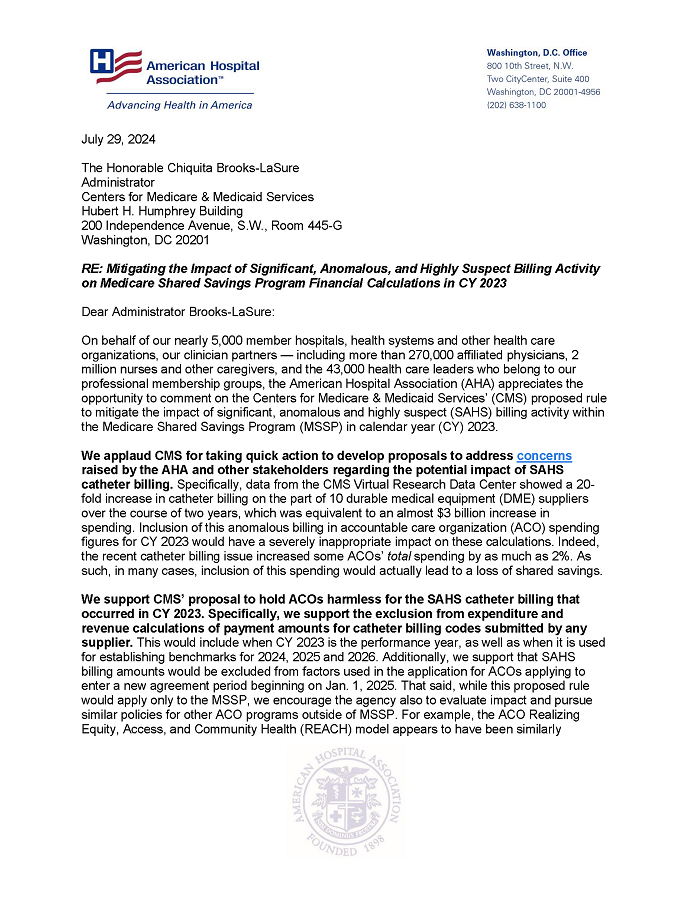

Comments on CMS’ Proposed Rule on Fraudulent Billing Activity within the Medicare Shared Savings Program
Comment Letter on CMS’ Proposed Rule to Mitigate the Impact of Significant, Anomalous and Highly Suspect Billing Activity within the Medicare Shared Savings Program in CY 2023
July 29, 2024
The Honorable Chiquita Brooks-LaSure
Administrator
Centers for Medicare & Medicaid Services
Hubert H. Humphrey Building
200 Independence Avenue, S.W., Room 445-G
Washington, DC 20201
RE: Mitigating the Impact of Significant, Anomalous, and Highly Suspect Billing Activity on Medicare Shared Savings Program Financial Calculations in CY 2023
Dear Administrator Brooks-LaSure:
On behalf of our nearly 5,000 member hospitals, health systems and other health care organizations, our clinician partners — including more than 270,000 affiliated physicians, 2 million nurses and other caregivers, and the 43,000 health care leaders who belong to our professional membership groups, the American Hospital Association (AHA) appreciates the opportunity to comment on the Centers for Medicare & Medicaid Services’ (CMS) proposed rule to mitigate the impact of significant, anomalous and highly suspect (SAHS) billing activity within the Medicare Shared Savings Program (MSSP) in calendar year (CY) 2023.
We applaud CMS for taking quick action to develop proposals to address concerns raised by the AHA and other stakeholders regarding the potential impact of SAHS catheter billing. Specifically, data from the CMS Virtual Research Data Center showed a 20-fold increase in catheter billing on the part of 10 durable medical equipment (DME) suppliers over the course of two years, which was equivalent to an almost $3 billion increase in spending. Inclusion of this anomalous billing in accountable care organization (ACO) spending figures for CY 2023 would have a severely inappropriate impact on these calculations. Indeed, the recent catheter billing issue increased some ACOs’ total spending by as much as 2%. As such, in many cases, inclusion of this spending would actually lead to a loss of shared savings.
We support CMS’ proposal to hold ACOs harmless for the SAHS catheter billing that occurred in CY 2023. Specifically, we support the exclusion from expenditure and revenue calculations of payment amounts for catheter billing codes submitted by any supplier. This would include when CY 2023 is the performance year, as well as when it is used for establishing benchmarks for 2024, 2025 and 2026. Additionally, we support that SAHS billing amounts would be excluded from factors used in the application for ACOs applying to enter a new agreement period beginning on Jan. 1, 2025. That said, while this proposed rule would apply only to the MSSP, we encourage the agency also to evaluate impact and pursue similar policies for other ACO programs outside of MSSP. For example, the ACO Realizing Equity, Access, and Community Health (REACH) model appears to have been similarly impacted by anomalous catheter billing.
We also encourage CMS to evaluate whether additional codes should be carved out of financial calculations for 2023. Some ACOs have reported, for example, that there have been similar increases in billing for skin substitutes (a $2.6 billion increase between 2022 and 2023) that also may artificially skew financial calculations and impact shared savings without action.
We recognize that even with a 30-day comment period, the process of carving out this spending from financial calculations may result in delays in timelines. Specifically, CMS stated that it anticipates a delay in reconciliation timelines by up to six weeks. Given the projected delays in reconciliation timelines, we encourage CMS to delay other ACO timelines, such as risk track selection deadlines and participation lists, to ensure alignment. Indeed, previous performance is an important factor that participants consider when determining whether, for example, they can assume more risk under a different performance track.
While this proposed rule marks a significant step to mitigate the impact of anomalous catheter spending for CY 2023, this is not the first, and unfortunately likely not the last, instance of ACOs reporting suspected fraudulent billing. As such, we commend CMS for including proposals to address the impact of SAHS in 2024 and future years as part of the CY 2025 physician fee schedule (PFS) proposed rule. We have urged for long-term policies to support the identification of SAHS. For example, we have recommended the establishment of an outlier policy to detect variation in anomalous spending above a certain threshold and remove services from future calculations. There also are opportunities to improve how ACOs report fraud, as well as to better educate ACOs on the process CMS and the Health and Human Services (HHS) Office of Inspector General (OIG) undertake to investigate fraud. As the HHS OIG has previously noted, ACOs are excellent sources to uncover potential fraud, waste and abuse by identifying patterns of unusual billing. We will provide additional comments in response to the CY 2025 PFS proposed rule.
We appreciate CMS’ timely proposal on this issue and look forward to working collaboratively on developing a longer-term strategy to detect and address anomalous billing. Please contact me if you have questions or feel free to have a member of your team contact Jennifer Holloman, AHA’s senior associate director of policy, at jholloman@aha.org.
Sincerely,
/s/
Ashley Thompson
Senior Vice President
Public Policy Analysis and Development


